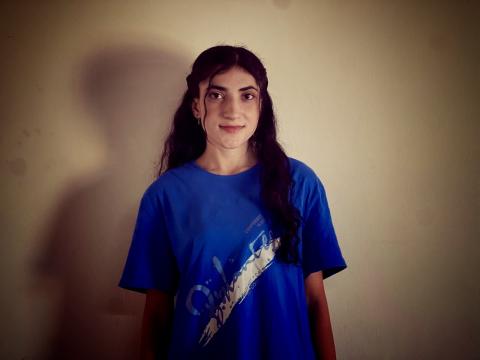Claiming her rights: Asia’s path to advocacy in Sinjar

“Before, I didn’t know what advocacy meant. Now, I know how to speak up—for myself, for my friends, and for my community.” — Asia, 21, Sinjar
Asia, a young photographer from Sinjar, has always loved capturing the stories of her community through the lens of her camera. But until recently, she had never imagined she could also be a voice for change. Today, she stands as a confident young advocate, determined to draw attention to the challenges facing her hometown.
Before 2014, Asia lived in a quiet village called Kirzrik, near Sinjar. When conflict forced her family to flee, they moved to Khanasour, around an hour away and then refuged to outside Iraq. Eventually, they returned to Sinjar, attempting to rebuild their lives in a place still deeply scarred by violence and displacement.
Asia now works with a local media foundation in Sinjar, made up entirely of young women like herself. Passionate about storytelling, she first joined a life skills training programme with World Vision Iraq. When later invited to take part in an advocacy training, she didn’t hesitate.
“The training lasted two days and was very useful,” she recalls. “The trainer explained everything in simple terms. I didn’t know anything about advocacy before. Now I know how to speak up, plan collectively, and demand our rights.”
The sessions helped Asia understand how to organise her community around shared needs. For example, her neighbourhood suffers from a lack of clean water—a basic necessity available in other parts of Sinjar. “Before, we didn’t know how to come together and approach the municipality to ask for water. After the training, we learnt how to unite and speak with one voice to claim our rights.”
Asia also noticed a personal transformation. “This was the first time I’d joined a training like this. It changed my personality—I became more confident.” That confidence empowered her to stand up in everyday situations such as at the hospital, where she demanded to be treated fairly in the queue, ensuring equal respect for all patients.
But perhaps the most profound shift was in her perspective on unity and coexistence. “Before the training, I didn’t have any Muslim friends. I thought I should only have Yezidi friends. But during the training, there were Muslim girls too and now we are friends. I realised we must be united, regardless of our religion or background.”
That sense of unity now fuels her advocacy. When a local organisation recently reached out to ask about the needs in Sinjar, Asia and a friend confidently listed the community’s most urgent issues: water shortages, lack of electricity, too few trees, and the need for better schools. “I wouldn’t have known how to speak about these things before. Now, I know how to express our needs clearly.”
Asia’s message to others in Sinjar is simple but powerful: “We must work together to claim our rights. Collective action is key.”
She reflects with pride on how far she has come. “Even though I was respected before, now people listen to me more. I speak with greater confidence, and they value my opinion.”
Asia hopes for more advocacy and vocational training opportunities in Sinjar. For her, these are not just workshops but life-changing experiences.
Linda Rashid, The Peace Building and Inclusion Technical Advisor for World Vision Iraq said, “Asia’s journey is a powerful example of how inclusive peacebuilding begins with voice and visibility. When young women are equipped with the tools to analise their context, organise collectively, and challenge exclusion, transformation becomes possible.In places like Sinjar, where communities are working to heal and rebuild, Asia’s leadership shows us that advocacy is not just about demanding services; it’s about rebuilding trust, shifting mindsets, and reclaiming agency. Her voice is no longer just her own—it now carries the aspirations of an entire generation seeking dignity and change.”
Through this awareness-raising and advocacy training programme, World Vision Iraq - through its Nexus Accelerator Fund, a project under the umbrella of Recovery and Resilient Pathways for Iraq—has trained 159 young people (94 female, 65 male), aged 21–29, in Sinjar and Ba’aj on advocacy and peacebuilding concepts. This multi-agency partnership, launched in 2024 by eight local and international organisations in Iraq, equips youth with the knowledge and tools to advocate for their rights, take ownership of their communities, and work collectively towards lasting solutions.
Afnan Jarjees, Project Manager for the Nexus Accelerator Fund, said: “Real change begins when every voice is heard. Through Nexus Accelerator Fund project, World Vision place the youth at the heart of transformation; when youths are empowered with advocacy and peace building skills, they can break cycles of conflict and build bridges of understanding, coexistence and living together peacefully. Our priorities are to ensure inclusion for all youth and particularly women and persons living with disabilities. In addition to amplifying voices of youth, we are also redefining leadership roles and are ensuring that peace belongs to everyone.”